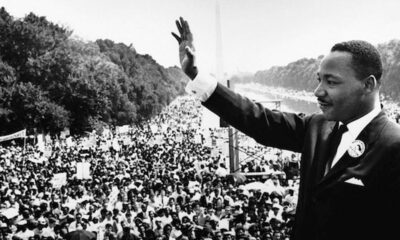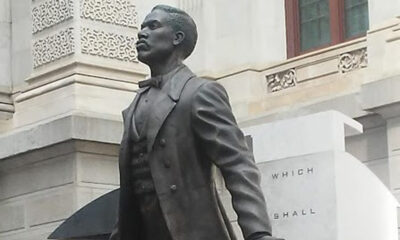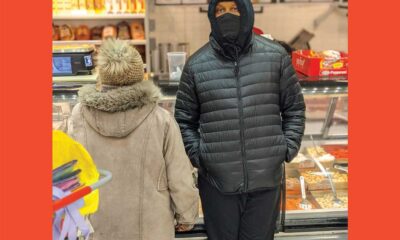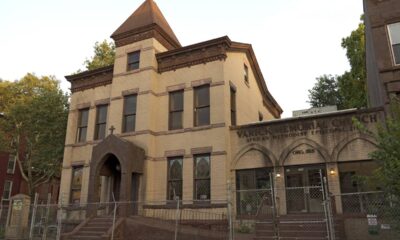City Politics
Kevin Powell: Ascent of a Political Activist
Two years ago, when community activist and writer Kevin Powell campaigned for the 10th Congressional seat currently held by Ed Towns, he knew he would have to run again. “We always knew it would be at least a two campaign race,” said Powell. “When you are challenging an entrenched incumbent, it often takes two races.”
A lot has happened since then.
Powell has continued his monthly male development meetings, a grassroots attempt to nudge males to do what he has done: “re-think everything I know about manhood.” He was asked to assist several vacationing families in a sustained effort for justice in the Antigua and Barbuda. He wrote his 10th book, Open Letters to America. He testified before the United Nations regarding gender violence. And, as further evidence of his maturation, there have been no salacious headlines.
So far this year, Powell’s campaign has raised more money, from more people, than during his entire 2008 campaign. Most donations are small, coming from 40 states across the nation. More Brooklyn people have donated. Big names, such as Marlon Wayans, have contributed big bucks. Powell’s new campaign manager, communications and field directors are operating “scientifically,” down to the smallest election district. The one thing Powell was proudest of in his 2008 campaign, has carried over to this year: no behind the scenes drama.
Kevin Powell is happy, and looks content. Campaigning is an opportunity to do what he does – serve others. His 18 hour days start at 5:30 am with Facebook and Twitter posts. From Boerum Hill to Canarsie, East Williamsburg to East New York, Powell hits the streets, delivering constituent services, such as GED, housing, or criminal justice referrals. “We spend as much time as necessary talking to each voter,” Powell said. “We want to demonstrate while we are campaigning the kind of services we will provide, once we got into Congress.”
Spending a few minutes on www.KevinPowell.net, one can find a listing of all the diverse neighborhoods in the district, ethnic, gender, and income data. There is even a history of Brooklyn. “We want to make this an educational process,” he said. Most important for Powell, the complete Campaign Platform can be found on the site, everything from health care, criminal justice, seniors, and net neutrality to violence prevention, immigration, education, and worker rights.
“Bridge to the Future” is Kevin Powell’s campaign theme. At 44-years-old, Powell stands firmly in the post-Civil Rights generation. In 1984, he was introduced to politics through the Jesse Jackson Presidential campaign and the anti-apartheid movement. “During the last 26 years, there has been a perpetual generation divide in the Black community. You see it in electoral politics grassroots activism,. You see it in the literary/ journalism world. You see it in the artistic community, in the business world, You see it in church. You see it in our Civil Rights organizations.” said Powell. “I am no longer a person who points fingers at the Civil Rights generation. I do see a resistance to supporting young people.”
Powell explained, “But, I think that younger people – myself and folks in the generation behind me – have got to do what many of us have been doing. Do your own thing. Don’t wait for someone to pass you a baton. There is never going to be a baton passed. For me, I started writing professionally when I was 20. People I organized with – Ras Baraka, Sista Soulja – we were in our early 20’s. We didn’t wait for permission to organize around Howard Beach or Bensonhurst back then. We just did it. We could lament on the generational divide. Or, do what I recommend: identify people in the various generations who are progressive and want practical solutions for our communities, and work together.”
While campaigning on the streets, Powell said, “I barely hear anyone talk about Civil Rights issues. What people say they need are jobs, affordable housing, quality education, recreational/ community centers for young people, safe streets for seniors, foreclosure. It’s really basic. How do we deal with stop-and-frisk? In one housing project in ENY, just the other day, several tenants who didn’t know each other said the same thing to us: the police in this area are constantly stopping our young men, throwing them on the ground and frisking them. Checking their shoes, their socks, their underwear. A man in his 50’s, a grown man, a grandfather said the police did that to him. People are talking about quality of life issues.”
This is a new day, we need new terms. Civil rights is a term that belongs in the 20th century. We are in the 21st century. We need a new terminology, and it is definitely coming.
We have got to develop our communities in six basic ways: spiritually, politically, culturally, economically, and two areas we don’t talk about – physical health and mental wellness. It is about holistic development of our communities.
We got the Civil Rights bill and the Voting Rights Act. On a basic level, we have citizenship. The thing we missed, that Dr. King talked about at the end of his life, is economic justice.
It is not enough to have back elected officials if they are not doing their jobs. I am not voting for someone anymore just because they are Black. That is unacceptable. This is what I am hearing throughout the community, from young and older people. Jewish folks in Boerum Hill said this to me. Black and Latino people in East New York said this to me. It is unacceptable to have elected officials who we do not see on a regular basis, or their representatives, who are not accessible, who we feel don’t have the volume loud enough on issues of importance to us.
In response to a question about the replication of poverty every 15 years by young girls being impregnated and abandoned by adults, Powell said “The worst gap that exists in Black America since the 1969’s is the class gap.” He recalled his young mother, with a grade school education and his father who was in his 30’s when he got her pregnant. “He didn’t even show up at the hospital when I was born. There is no record of my father being anywhere around. Powell is my mother’s last name. Here I am, left to be raised on welfare, food stamps, government cheese, in tenement dwellings where it was normal to have not mice, but rats running everywhere. It was normal to have roaches everywhere, even inside the refrigerator, which was often broken so you couldn’t close it all the way. A lot of people don’t understand that kind of life, and what it does to you.”
Powell has been there. With gratitude, he said, “But for the grace of God and my mother’s vision for her child, which is me, and not accepting this is what we are destined to – a life of misery and doom. Unfortunately, what happens to a lot of us, particularly if we have low self-esteem, is we get stuck there.” Powell described an all too common situation in Black and brown communities, “If you are a young woman of color in a world where you are dealing with racism, and sexism, and classism, if you are 14-years-old, you have already been told you are nothing, and the only thing that is valuable about you is from your neck down. Then some man or older boy comes along. Next thing you know you are pregnant, or have an STD or one of the 92% of new cases NYC of Black and Latino women carrying the HIV virus. That is what happens. It becomes what Malcolm X called a vicious cycle not only in Brooklyn, but in Harlem, Oakland, New Orleans, Houston, all over the country. I travel to the Caribbean. It’s in Jamaica.”
According to Powell, “Unfortunately, we in this country confused Civil Rights and integration with progress for the entire community. That wasn’t the case. I don’t blame the young women or the young men. Many don’t know any better. They are carrying profound self hatred; when you hate yourself as a Black person, you will not only destroy yourself, you move to destroy other people who look like you.”
“The solution is simple, but complex,” Powell said. “We need more men like Kevin Powell, like Quentin Walcott, and Byron Hurt, to speak out loudly against all forms of sexism.” Powell said he used to be one of those men; only because of God and counseling, he has evolved.
Of all the issues Powell would like to address if and when he is elected to Congress, economic development is paramount. He said he went to Head Start pre-school. There was a free breakfast and lunch program at school, went to an after school program at the Y. His first summer job was a CETA job. During college, he got help from EOP. His mother got help with housing through voucher programs, like Section 8. “Those were all created by the government to give people a hand – not because we were lazy, shiftless, or intellectually inferior,” said Powell, “but because we were poor.”
Kevin Powell said quality of life issues require “a 21st century approach. The issues are what people say they need – jobs and job training.” If elected, Powell would like to serve on education, health, and economic development committees. He suggests small business incubators. “Most of the U.S. population is under 45 and technologically savvy. We al have a hand held device and email. We have to create some jobs and business opportunities that are about technology and the green economy, Powell said. “I look at all these abandoned buildings, including factories, here in the 10th congressional district. Imagine if some of those were turned into technology help centers. Those are low skill jobs that could be for people in this country, right here in Brooklyn. That is the type of issue I will be fighting for.”














